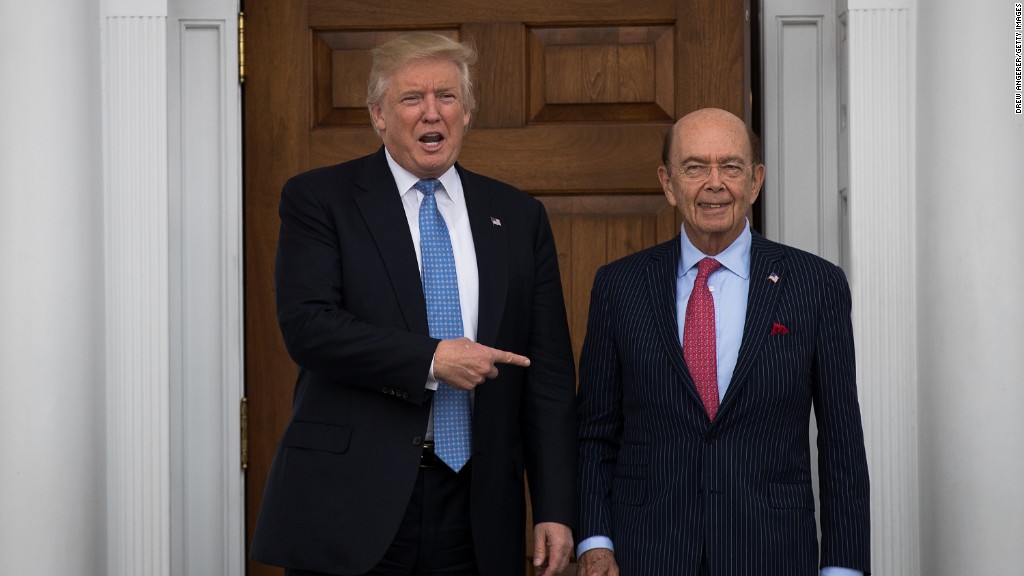
Billionaire Wilbur Ross, President-elect Donald Trump's pick for commerce secretary, wants countries that resort to "malicious" trading tactics to be "severely" punished.
Specifically, Ross pointed the finger at China, whom he called "the most protectionist country of very large countries."
Ross's comments come after China's President Xi Jinping sought to cast himself as a fierce defender of free trade. "Whether you like it or not, the global economy is the big ocean you cannot escape from," Xi said in a speech on Tuesday at the World Economic Forum in Davos. "No one is a winner in a trade war."
In fact, Ross's comments seemed directly aimed at China when he said: "It's one thing to talk about free trade. We would like to have our trading partners also practice free trade."
Related: U.S. businesses in China aren't buying Xi's free trade stance
Ross, who made a fortune as a turnaround artist that resurrected dying manufacturing businesses, said the U.S. should provide access to its vast market to "nations who agree to play by our standards of fair trade."
But countries that don't "play by the rules" should "get punished -- and severely," he said.
Trump has suggested tariffs as one way to retaliate and Ross seems to support that option. He said tariffs "play a role both as a negotiating tool and, if necessary, to punish offenders who don't play by the rules."
But Ross didn't give a full-throated endorsement of Trump's threat of a 35% tariff on auto makers and other companies that move jobs abroad.
Asked if he'd oppose a 35% tariff, Ross said, "It's a complicated issue whether you should have one flat tariff on everything or whether it should be more tailored."
Many have warned that Trump tariffs risk a trade war. That's what happened during the Great Depression after the U.S. raised tariffs on thousands of goods with the Smoot-Hawley Act. Other nations retaliated and the global economy suffered.
Related: Remember Smoot-Hawley: America's last trade war worsened the Great Depression
Ross said he's "keenly aware of Smoot-Hawley" and its negative consequences.
"We can learn from history that that approach didn't work well...and it very likely will not work very well now," he said.
Ross reiterated that Trump plans to fix U.S. trade in part by renegotiating trade agreements, especially NAFTA, the free trade deal between the U.S., Canada and Mexico.
NAFTA is "logically the first thing for us to deal with" and will be a "very, very early topic in this administration," Ross said.
Trump's pick for commerce secretary said "all aspects of NAFTA would be put on the table" and argued that trade agreements should be subject to re-opening after a few years.
China was a frequent target of Ross's criticism. He pointed to accusations of China dumping excess steel and aluminum and Beijing's support for unprofitable state-owned enterprises.
Related: Ross selling some -- but not all -- of his empire
During the campaign, Trump repeatedly blamed China, as well as poorly-designed trade agreements, for the loss of manufacturing jobs in the Rust Belt that helped carry him to victory in November.
"We can't continue to allow China to rape our country," Trump said in May.
Ross has sharpened his rhetoric in recent months, after previously urging politicians to temper their anti-China comments. CNN's KFile reported this week about a 2007 speech from Ross, in which he expressed worry about the rise of a "protectionist monster" in the West and "mindless China bashing."
The backlash against anti-globalization has helped kill the Trans-Pacific Partnership trade agreement. Ross explained why he has come out against the controversial trade deal after originally supporting it.
Ross said he discovered inconsistencies in TPP, including a section that allows for more than 60% of the components that go into making cars to come from outside TPP countries and still enjoy member benefits.
"That didn't strike me as the world's best idea," Ross said.
Related: Trump commerce pick once blasted 'China bashing'
Ross's fortune -- Forbes estimates his net worth at $2.5 billion -- and sprawling web of assets -- has raised concerns over potential conflicts of interest.
The billionaire filed paperwork in recent days indicating he has agreed to sell some, but not all, of his complex empire. If he's confirmed, Ross plans to step down from various companies and quickly sell many assets.
But Ross plans to hold on to nine investment vehicles that contain shipping, mortgage lending and real estate financing assets. Ross explained he will keep these assets "solely as a passive investor."
During the hearing, Democratic Sen. Richard Blumenthal noted that this process was "enormously complex, challenging and costly" to Ross personally and suggested Trump should follow his lead. Trump has been criticized for declining to sell his stake in his business empire.
"You were able to do it. Why not the president?" Blumenthal asked.


